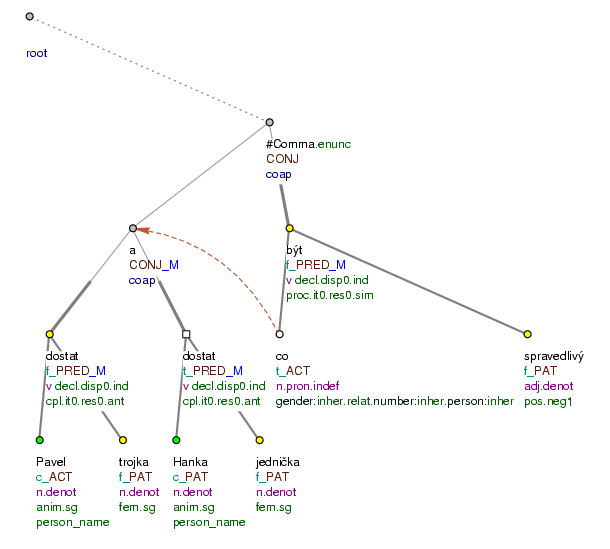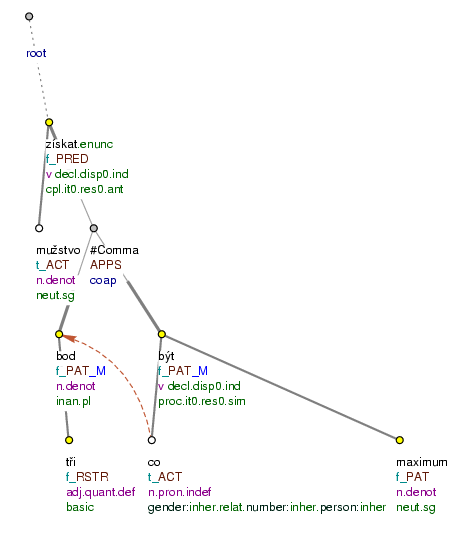Relative pronouns and pronominal adverbs introducing relative clauses are linked to their antecedent in the governing clause (the effective root nodes of relative clauses are assigned the RSTR functor; for more on relative clauses, see Section 5, "Dependent verbal clauses"). As for coreference, relative clauses follow a uniform pattern: the relative element corefers with the noun modified by the dependent clause. Cf.:
-
Za informační dálnici se považuje světová telekomunikační síť, po níž lze přenášet zvuk, data i obraz a která tak otevírá přístup k množství informatických služeb. (=...a net which makes it possible to transfer sound, data...)
The relative expression níž (=which) corefers with the noun síť (=net) modified by the dependent relative clause. Cf. Fig. 9.6.
-
Film se odehrává na venkově, v městečku Sardent, kam se po letech vrací - aby si tam léčil zdraví - tamější rodák. (=The film takes place in a town, to which a native returns after many years...)
The pronominal adverb kam (=where) corefers with the noun městečko (=town) modified by the dependent relative clause. Cf. Fig. 9.9.
Coreference is represented in the tree also in cases of false relative clauses (see Section 5.4.1, "False relative clauses"). Cf.:
-
Představitelé Hnutí ochránců zvířat obvinili ředitelku Interpespenziónu ze špatné péče o psy, kteří v útulku údajně hynou na infekční onemocnění. (=...bad treatment of the dogs, which are said to be dying from infectious diseases)
The relative pronoun kteří (=which) corefers with the noun psi (=dogs) modified by the dependent relative clause. Cf. Fig. 9.10.
More examples:
Ti, co kroutí hlavami, nerozumí a nechápou, zároveň instinktivně varují. (=Those who shake their heads...) Fig. 9.7
K největšímu zhoršení došlo v oblasti stavebnictví, kde se počet insolventních firem oproti roku 1993 zvýšil o 24 procent. (=The worst deterioration took place in the construction industry where the number of insolvent companies increased...) Fig. 9.8
Figure 9.6. Coreference with relative elements
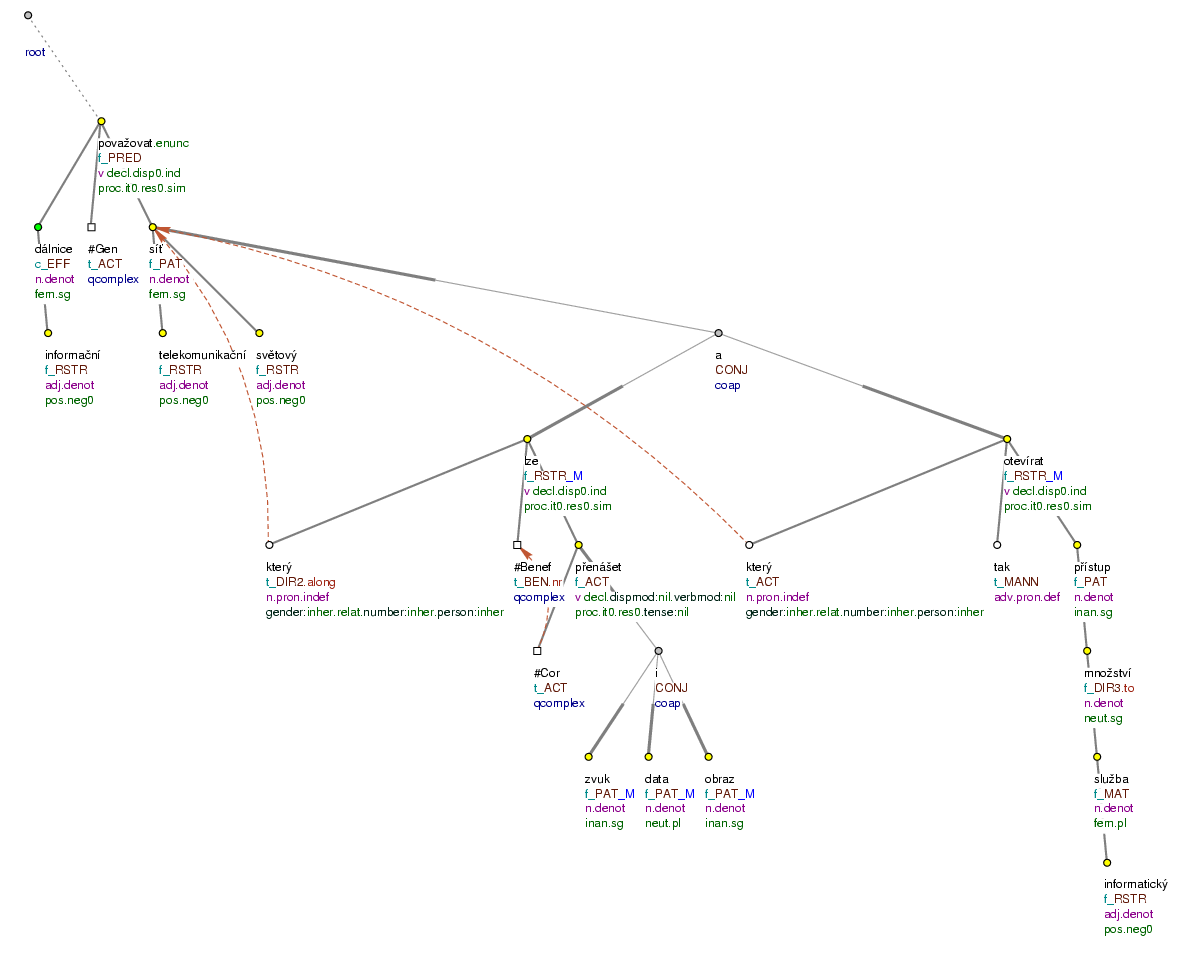
Za informační dálnici se považuje světová telekomunikační síť, po níž lze přenášet zvuk, data i obraz a která tak otevírá přístup k množství informatických služeb. (=lit. For information highway REFL considers world telecommunications net, on which is_possible to_transmit sound, data as_well_as picture and which thus opens access to abundance (of) information services)
Figure 9.7. Coreference with relative elements
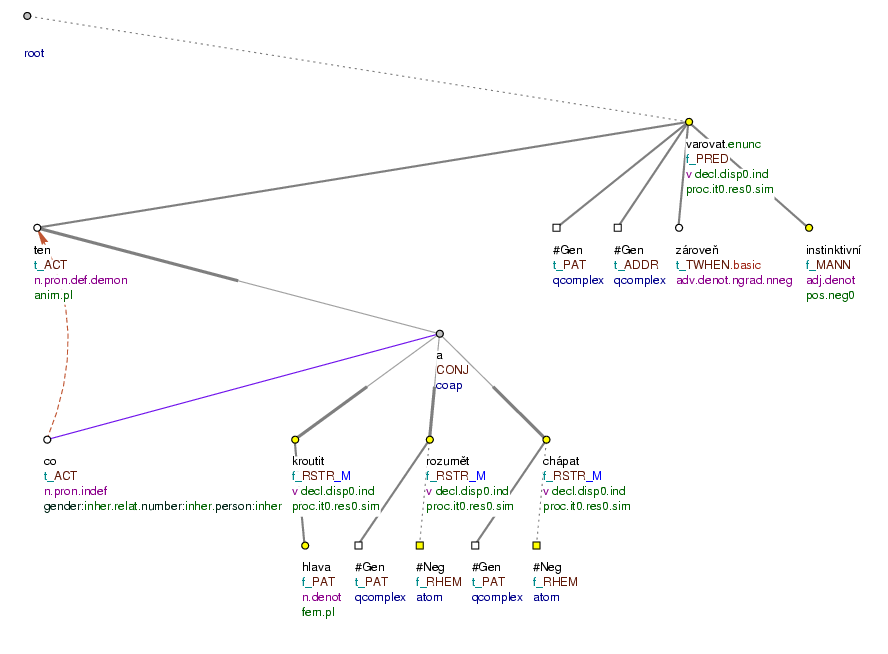
Ti, co kroutí hlavami, nerozumí a nechápou, zároveň instinktivně varují. (=lit. Those, who shake heads, not_understand and not_comprehend, simultaneously instinctively warn)
Figure 9.8. Coreference with relative elements
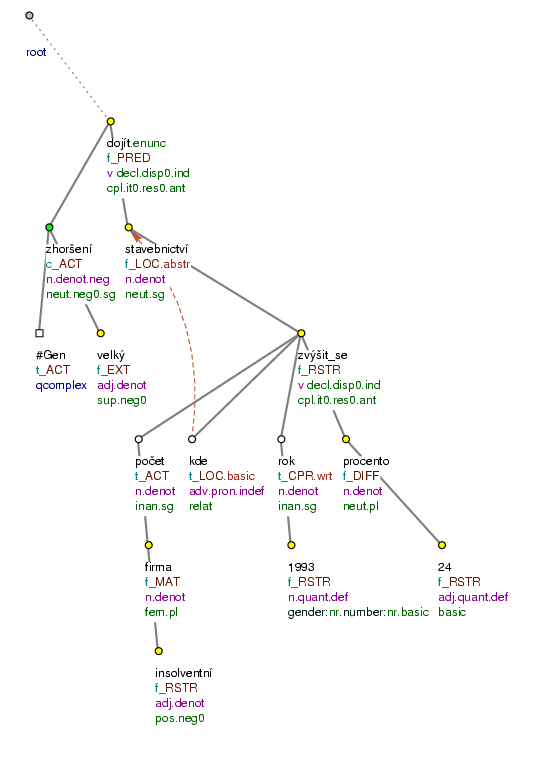
K největšímu zhoršení došlo v oblasti stavebnictví, kde se počet insolventních firem oproti roku 1993 zvýšil o 24 procent. (=lit. - worst deterioration took_place in area (of) construction_industry, where REFL number (of) insolvent companies in_comparison_to year 1993 increased by 24 percent)
Figure 9.9. Coreference with relative elements
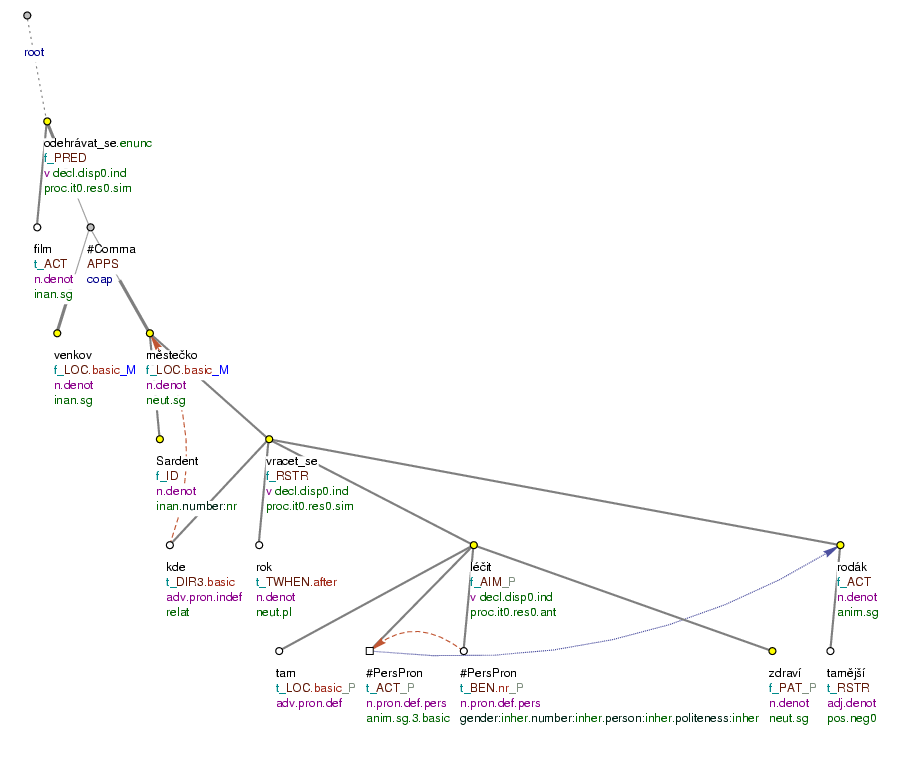
Film se odehrává na venkově, v městečku Sardent, kam se po letech vrací - aby si tam léčil zdraví - tamější rodák. (=lit. Film REFL takes_place in country, in town Sardent, where REFL after years returns - to (him)self there cure health - local native)
Figure 9.10. Coreference with relative elements
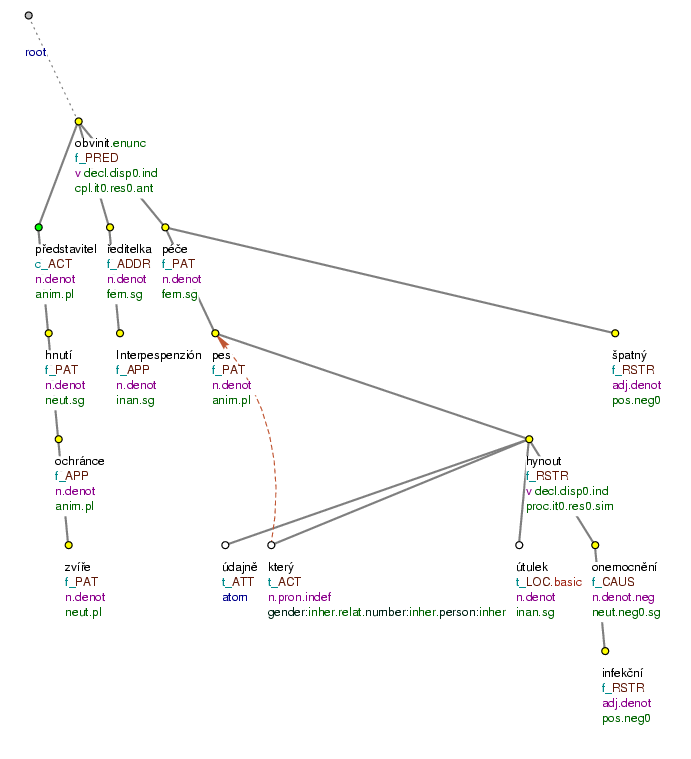
Představitelé Hnutí ochránců zvířat obvinili ředitelku Interpespenziónu ze špatné péče o psy, kteří v útulku údajně hynou na infekční onemocnění. (=Representatives (of) Movement (of) protectors (of) animals accused manager (of) Interpespenzión of bad treatment of dogs, which in animal_home allegedly die from infectious diseases)
Coreference is involved also in cases in which the relative element což (=which) is used (including the oblique cases; e.g. bez čehož, čemuž). Clauses introduced by this relative element are represented as paratactic structures (see Section 5.4.1.1, "Constructions with the connectives "což", "přičemž", "načež", "pročež", "začež", "aniž"").
Což usually corefers with the left sister of its governing verb (see the rules for representing relative clauses with což Section 5.4.1.1, "Constructions with the connectives "což", "přičemž", "načež", "pročež", "začež", "aniž"").
The following cases are distinguished:
-
most often, což connects two clauses (in a coordination) and což refers to the whole preceding clause. The left sister of the verb on which což depends is the effective root node of the preceding clause. Cf.:
-
Damiána sem nasadila komunistická tajná policie, což samozřejmě Povolný nemohl tušit. (=Damian was engaged by the communist police, which Povolný couldn't know)
Což refers to the whole preceding clause Damiána sem nasadila komunistická tajná policie; there is a coreference relation between což and the effective root node of the preceding clause: nasadit (=engage). Cf. Fig. 9.11.
-
-
further, there is a regular type of construction in which several clauses are coordinated (in a complex hierarchy). Což refers to the whole complex of the preceding coordinated clauses. The left sister of the verb on which což depends is the effective root node of the paratactic structure (
nodetype=coap). Cf.:-
Pavel dostal trojku a Hanka jedničku, což je nespravedlivé. (=Pavel got C and Hanka A, which is not fair)
Což refers to both preceding clauses Pavel dostal trojku a Hanka jedničku; there is a coreference relation marked between což and the root node of the paratactic structure, the conjunction a. Cf. Fig. 9.12.
-
-
occasionally, což does not refer to the whole preceding clause but only to one expression in the clause. Then, the relative clause introduced by což enters into a coordination or apposition with this expression. The left sister of the verb on which což depends is the node representing the coreferred expression. Cf.:
-
Mužstvo získalo tři body, což je maximum. (=The team got three points, which is the maximum)
Což refers to tři body (=three points), there is a coreference relation marked between což and the noun bod (=point). The expression tři body and the clause což je maximum are in apposition. Cf. Fig. 9.13.
-
-
due to the nature of což, coreference extending beyond sentence boundaries is also possible. Since in these cases, the division into separate sentences is purely formal, also here, the relative expression refers to the preceding clause: the antecedent is the governing verb of the whole preceding sentence. Cf.:
-
Právě vedoucí týmu Motorsport Škoda Pavel Janeba jen pokrčil rameny na otázku, jak dopadlo jednání uvnitř koncernu VW, které soutěže v příštím roce jeho tým absolvuje a které ne a kolik jich dohromady bude, jaká bude celková strategie. Což znamená, že vše je zatím ve hvězdách. (=PJ only shrugged his shoulders instead of answering the question... Which means that everything is in the stars)
There is a coreference relation between což and the root node of the preceding sentence, the verb pokrčit (=shrug).
-
Pan předseda Lux se nemůže smířit s tím, že podpora jeho křesťansky orientované strany je taková, jaká je. Což ho, myslím, vede ke křečovitým formulacím. (=Lux can't accept the fact that... Which forces him to say what he's saying)
There is a coreference relation between což and the root node of the preceding sentence, the modal predicate nemůže se smířit (=cannot accept).
-
Figure 9.11. Coreference with což
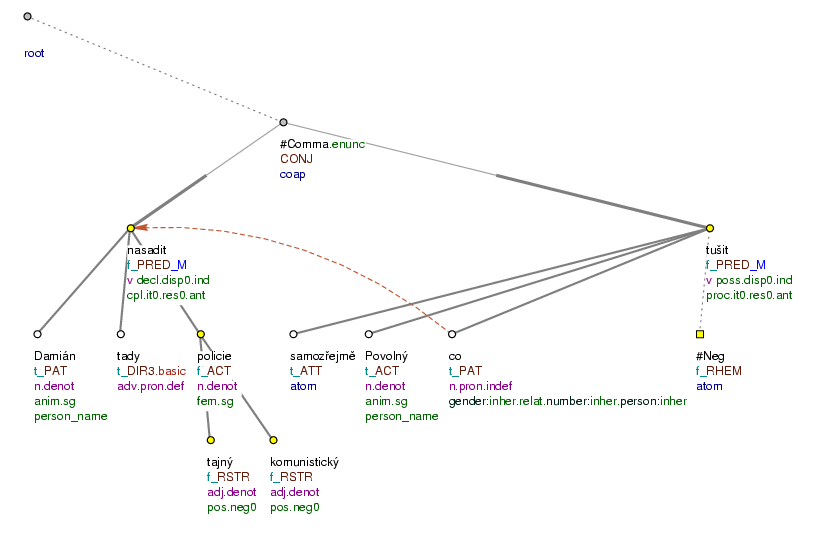
Damiána sem nasadila komunistická tajná policie, což samozřejmě Povolný nemohl tušit. (=lit. Damian.ACC here put communist security police.NOM, which of_course P. couln't suspect)
